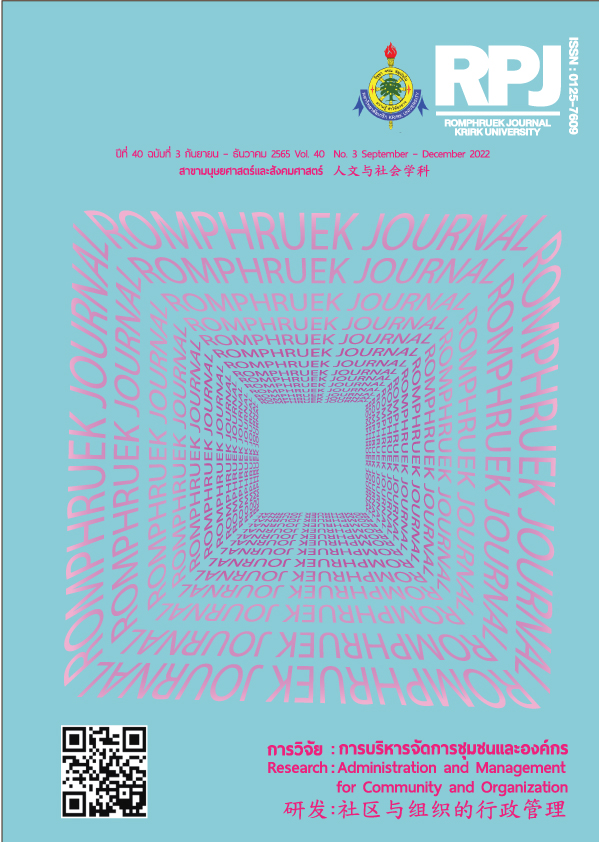Legal Measures to Deal With Fake News
Main Article Content
Abstract
The purposes of this research were to investigate the legal measures taken to deal with the dissemination of fake news that are currently major concern, and to analyze guidelines for taking legal measures against the dissemination of fake news in the future. This research was a qualitative research. The samples of this research were 102 key informants consisted of policy level executives involved anti-fake news, related agency personnel, entrepreneurs, operators, persons who were affected by fake news, and legal experts. The data were collected from analyzing the documents, in-depth interviews, and participation and non-participation observations. The results of the research were 1) The current legal measures taken against the dissemination of fake news are: Thailand’s Computer-Related Crime Act, B.E. 2560, a criminal code that contains provisions for defamation offenses, Criminal Code for Petty Offenses, and the Civil and Commercial Code of Infringement; 2) Guidelines for taking legal measures to deal with fake news in the future are as follows: to improve the law on broadcasting and television businesses; to supervise the contents of the operators; to revoke the license of journalists who publish fake news; to amend the electoral law in cases where people who create or spread fake news are disqualified from political office; to enact a law to regulate platform technology providers, technology companies, and social media providers to take responsibility for controlling the spread of fake news and removing illegal news content from the system and blocking illegal content on the system within 24 hours; to regulate the platform operators to disclose details of advertisements found to be fraudulent or providing illegal content; and to enact a law which promotes integrated management of fake news with multi-stakeholder engagement.
Article Details

This work is licensed under a Creative Commons Attribution-NonCommercial-NoDerivatives 4.0 International License.
Every article published in the Romphruek Journal of the Humanities and Social Sciences is the opinion and point of view of the authors. Thery're not the viewpoint of Krirk University or the editored department. Any part or all of the articles for pablication must be clearly cited.
References
ไกรฤกษ์ เกษมสันต์. (2561). กฎหมายอาญา มาตรา 288 – 366/4 เอกสารประกอบการบรรยายสำนักอบรมกฎหมายแห่งเนติบัณฑิตไทย ภาค 1 สมัยที่ 71 ปีการศึกษา 2561. กรุงเทพฯ : สำนักอบรมกฎหมายแห่งเนติบัณฑิตไทย.
เฉลิมชัย กิกเกียรติกุล และ ธัญญนนทณัฐ ด่านไพบูลย์. (2561). ข่าวลวง : ปัญหาและความท้าทาย. วารสารวิชาการ กสทช, 2(2), 173-192.
ณัฐนันท์ อิทธิยาภรณ์. (2562). ผลกระทบของข่าวปลอม แนวทางรับมือของผู้บริโภคสื่อ. (15 มกราคม2563) สืบค้นจาก https://WWW.isranews.org/isranews-article/78298-fake-78298.html.
ดนยา สุเวทเวทิน. (2562). ข่าวเทียม ข่าวปลอม ข่าวลือ คืออะไร. (15 มกราคม 2563) สืบค้นจาก https://WWW.thaihealth.or.th/content/43451.
นันทิกา หนูสม. (2560). ลักษณะของข่าวปลอมในประเทศไทยและระดับความรู้เท่าทันข่าวปลอมบนเฟชบุ๊คของผู้รับสารในเขตกรุงเทพมหานคร. สาขาวิชาการสื่อสารเชิงกลยุทธ์ บัณฑิตวิทยาลัย มหาวิทยาลัยกรุงเทพ, กรุงเทพฯ.
บุญยศิษย์ บุญโพธิ์. (2556). ข้อสังเกตเกี่ยวกับความรับผิดทางกฎหมายฐานหมิ่นประมาท : กรณีศึกษาการกระทำความผิดในสังคมออนไลน์. วารสารการเมือง การบริหาร และกฏหมาย, 5(3), 183- 211.
ปณิตตา เกษมจันทโชติ. (2562). ปลุกสังคมสู้วิกฤติ Fake News. (15 มกราคม 2563) สืบค้นจาก
https://WWW.77kaoded.com/content/author/panidda.
ผู้จัดการออนไลน์. (2562). รัฐบาลสิงคโปร์งัดกฎหมายข่าวปลอม. (20 มกราคม 2564) สืบค้นจาก
https://mgronline.com/around/detail/9620000119349.
พิกุล จันทวิชญสุทธิ. (2563). การตรวจสอบข่าวปลอม. (20 มิถุนายน 2563) สืบค้นจาก
https://WWW.isranews.org/isranews-article/75870-fakenews.html.
รัตนาภรณ์ จอมมูล. (2563). มาตรการทางกฎหมายในการกำกับควบคุมข่าวปลอมทางการเมืองบนโลกไซเบอร์. CMU Journal of Law and Sciences, 13(1), 1-23.
วารี นาสกุล. (2540). ประมวลกฎหมายแพ่งและพาณิชย์ว่าด้วยละเมิดจัดการงานนอกสั่งและลาภมิควรได้. กรุงเทพฯ : มหาวิทยาลัยรามคำแหง.
วิโรจน์ เลิศจิตต์ธรรม. (2564). เปิดรายชื่อประเทศผ่านกฎหมาย Fake news ท่ามกลางวิกฤตโควิด. (20 มกราคม 2564) สืบค้นจาก https://thestandard.co/fake-news-rules-country-list/.
สมาคมนักข่าววิทยุและโทรทัศน์. (2561). สัมมนาวิชาการ “วิกฤติ Fake News ในนิเวศธุรกิจสื่อ”. (10 มกราคม 2563) สืบค้นจาก http://WWW.thaibja.org/?p=3909.
สราวุธ ปิติยาศักดิ์. (2565). คำอธิบาย พ.ร.บ. ว่าด้วยการกระทำความผิดเกี่ยวกับคอมพิวเตอร์.กรุงเทพฯ : มหาวิทยาลัยสุโขทัยธรรมาธิราช.
สำนักเลขาธิการนายกรัฐมนตรี. (2563). กระทรวงดิจิทัลฯ เปิดตัวศูนย์ต่อต้านข่าวปลอม. (21 ธันวาคม 2563) สืบค้นจาก https://WWW.thaigov.go.th/news/contents/details/24306.
สุปัญญา อภิวงศ์โสภณ. (2561). การตรวจสอบข่าวปลอมด้วยวิธีการเรียนรู้ด้วยเครื่อง. กรุงเทพ : จุฬาลงกรณ์มหาวิทยาลัย.
สุรพงษ์ โสธนะเสถียร. (2553). การสื่อสารกับสังคม. กรุงเทพฯ : โรงพิมพ์จุฬาลงกรณ์มหาวิทยาลัย.
สุธิดา ผิวขาว. (2563). การหมิ่นประมาททางสื่อสังคมออนไลน์. วารสารวนัมฎองแหรกพุทธศาสตรปริทรรศน์, 7(1), 97-111.
หยุด แสงอุทัย. (2538). กฎหมายอาญา. กรุงเทพฯ : มหาวิทยาลัยธรรมศาสตร์.
อิสริยะ ไพรีพ่าย. (2560). Fake News ปัญญาใหญ่ของโลกอินเทอร์เน็ต. (10 มกราคม 2563) สืบค้นจาก
http://WWW.okmd.tv/blogs/all-thinks-digital/fake-news.
ILaw. (2562). กฎหมายต่อต้าน “ข่าวปลอม” มีมากมายไม่ควรใช้เพื่อประโยชน์ทางการเมือง. (10 ธันวาคม 2564) สืบค้นจาก https://ilaw.or.th/node/5370.


